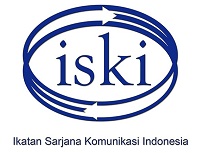Autopoietic system: New perspective in the development communication study
Abstract
Background: Understanding the concept of development communication is necessary. The study of development communication has grown and tends to be dynamic in Africa and Asia. Any communication modifications are crucial, and they can serve as the starting point for the development history. Purpose: The research aimed to develop a new perspective for studying development communication. Methods: The research used a qualitative approach. It analyzed the evolution and history of concepts that developed in the study of development communication in Africa and Asia. The data were collected through a review of literature from various journals, books, and other publications relevant to development communication studies in Africa and Asia. The researchers used a literature review as a methodology, considering that knowledge production is getting faster. Besides, the researchers complemented the study on development communication among Micro, Small, and Medium Enterprises (MSMEs) in Indonesia’s context. Results: The study showed that development communication is most relevant to developing countries such as Africa and Asia. Based on the best practice of MSME in DIY, the autopoietic system by Niklas Luhmann is essential as an innovative perspective in development communication study. The autopoietic approach emphasizes that the system will produce its components self-creation to reduce complexity. It consists of communication, evolution, and differentiation, which build up the autopoietic system. Conclusion: The logic of the autopoietic system, which negates humans, is still challenging to build awareness of communication significance as the core of development communication, not the actors. Implications: This idea suggests the impact of advancing communication studies, particularly future communication studies development.
Keywords
Full Text:
PDFReferences
Adiprasetio, J. (2022). The development of communication research in Indonesia in 2001-2020. Jurnal Kajian Komunikasi, 10(1), 105. https://doi.org/10.24198/jkk.v10i1.35954
African Business. (2022). Unlocking SME potential through the power of emerging technology.
Albert, M. (2016). Luhmann and systems theory. In Oxford Research Encyclopedia of Politics. Oxford University Press. https://doi.org/10.1093/acrefore/9780190228637.013.7
Bakti, I., Zubair, F., & Budiana, H. R. (2023). Participatory communication as the key to successful disaster management in Pangandaran district. Jurnal Kajian Komunikasi, 11(2), 195. https://doi.org/10.24198/jkk.v11i2.49785
Bappeda.jogjaprov.go.id. (2023). Data UMKM (Data of MSME in DIY). https://bappeda.jogjaprov.go.id/dataku/data_dasar/index/107-umkm?id_skpd=284.
Baraldi, C., Corsi, G., & Esposito, E. (2021). Unlocking Luhmann: A Keyword Introduction to Systems Theory.
Barranquero, A. (2017). Rediscovering the Latin American roots of participatory communication for social change. Westminster Papers in Communication and Culture, 8(1), 154–177. https://doi.org/10.16997/wpcc.179
Creswell, J.W., C. B. P. (2018). Qualitative Inquiry & research design: Choosing among five approaches. In Sage (4th ed.). SAGE Publications.
Dissayanake, W. (2008). Development communication: Asia. The International Encyclopedia of Communication. https://doi.org/10.1002/9781405186407.wbiecd022
Djanibekov, N., Van Assche, K., & Valentinov, V. (2016). Water governance in central Asia: A luhmannian perspective. Society & Natural Resources, 29(7), 822–835. https://doi.org/10.1080/08941920.2015.1086460
Durand, F. (2017). Evolution, reproduction and autopoiesis. HTS Teologiese Studies / Theological Studies, 73(3), 1–8. https://doi.org/10.4102/hts.v73i3.4726
Ekanem, S. A. (2020). The place of individual rights in communal Africa. International Journal of Humanities and Innovation (IJHI), 3(2), 74–78. https://doi.org/10.33750/ijhi.v3i2.72
Etoundi, R. A., Onana, S. F. M., Eteme, A. A., & Ndjodo, M. L. F. (2016). Special issue on ICT for Africa development: An introduction and framework for research. The Electronic Journal of Information System in Developing Countries, 76(1), 1–11. https://doi.org/10.1002/j.1681-4835.2016.tb00551.x
Eunice Annan-Aggrey, Elmond Bandauko, & Godwin Arku. (2021). Localising the sustainable development goals in Africa: implementation challenges and opportunities. Commonwealth Journal of Local Governance, 24, 4–23. https://doi.org/10.5130/cjlg.vi24.7739
Evans, O. (2019). Information and communication technologies and economic development in Africa in the short and long run. International Journal of Technology Management & Sustainable Development, 18(2), 127–146. https://doi.org/10.1386/tmsd_00002_1
Fliert, E. van de & Thomas. (2015). Interrogating the theory and practice of communication for social change. Palgrave Macmillan.
Hardi, A. T. (2020). Penggerak ekonomi di DIY, 76% dari Sektor UMKM. https://mediaindonesia.com/nusantara/331683/penggerak-ekonomi-di-diy-76-dari-sektor-umkm
Humas DIY. (2023). AHH Tertinggi Di Indonesia, Kemiskinan DIY Masih Menjadi PR
Latif, Z., Yang, M., Pathan, Z. H., & Jan, N. (2017). Challenges and prospects of ICT and trade development in Asia. Human Systems Management, 36(3), 211–219. https://doi.org/10.3233/HSM-171780
Lee, D. (2000). The society of society: The grand finale of Niklas Luhmann. Sociological Theory, 18(2), 320–330. https://doi.org/Lee, D. (2000). The Society of Society: The Grand Finale of Niklas Luhmann. Sociological Theory, 18(2), 320–330. doi:10.1111/0735-2751.00102
Luhmann, N. (1995). Social Systems (John Bednarz. Jr & Dirk Baecker (ed.)). Stanford University Press.
Marshall, C. and G. B. R. (2016). Designing qualitative research (Sixth). Sage Publication, Inc.
Meidina, A. P., & Murfi, A. (2024). Environmental communication and disaster mitigation by mobile application and website. Jurnal Kajian Komunikasi, 12(1), 60–79. https://doi.org/10.24198/jkk.v12i1.53996
Meyer, S., B. G. dan P. W. (2015). Niklas Luhmann: Social systems theory and the translation of public health research. In IThe Palgrave Handbook of Social Theory in Health, Illness, and Medicine (pp. 180–186). Palgrave Macmillan. https://doi.org/10.2307/j.ctvw1d575.26
Nashihuddin, W. (2019). Penerapan sistem autopoetic Niklas Luhmann dalam kegiatan komunikasi ilmiah pustakawan. February. https://doi.org/10.13140/RG.2.2.26924.21127
Nchake, M. A., & Shuaibu, M. (2022). Investment in ICT infrastructure and inclusive growth in Africa. Scientific African, 17, e01293. https://doi.org/10.1016/j.sciaf.2022.e01293
Nuttavuthisit, K., Jindahra, P., & Prasarnphanich, P. (2015). Participatory community development: evidence from Thailand. Community Development Journal, 50(1), 55–70. https://doi.org/10.1093/cdj/bsu002
Okaka, W. T. (2016). Communication for Sustainable Development Goals in Africa. December, 2–3.
Pristiandaru, D. L. (2022). Daftar negara maju dan negara berkembang di Afrika (List of Developed Countries and Developing Countries in Africa). https://internasional.kompas.com/read/2022/02/10/220100470/daftar-negara-maju-dan-negara-berkembang-di-afrika.
Quebral, N. (2012). Development communication primer. Southbound.
Ritzer, G. (2011). Sociological theory (8th ed.). McGraw-Hill.
Schirmer, W., & Michailakis, D. (2015). The Luhmannian approach to exclusion/inclusion and its relevance to Social Work. Journal of Social Work, 15(1), 45–64. https://doi.org/10.1177/1468017313504607
Schwanitz, D. (1995). Systems theory according to Niklas Luhmann: Its environment and conceptual strategies. Cultural Critique, 30, 137. https://doi.org/10.2307/1354435
Seidl, D. (2004). Luhmann’s theory of autopoietic social systems. Ludwig-Maximilians-Universität München Munich School of Management.
Servaes, L., & Servaes, J. (2021). Participatory communication for social change. In Handbook of Communication and Development (pp. 120–141). Edward Elgar Publishing. https://doi.org/10.4337/9781789906356.00015
Snyder, H. (2019). Literature review as a research methodology: An overview and guidelines. Journal of Business Research, 104, 333–339. https://doi.org/10.1016/j.jbusres.2019.07.039
Torraco, R. J. (2016). Writing integrative literature reviews. Human Resource Development Review, 15(4), 404–428. https://doi.org/10.1177/1534484316671606
Volgger, M., Mainil, T., Pechlaner, H., & Mitas, O. (2015). Health region development from the perspective of system theory – An empirical cross-regional case study. Social Science & Medicine, 124, 321–330. https://doi.org/10.1016/j.socscimed.2014.05.004
Wahyuni, H. I. (2019). Ecological communication in information society: reflections on Niklas Luhmann’s thought in understanding ecological & disaster issues in Indonesia. Jurnal Komunikasi: Ikatan Sarjana Komunikasi Indonesia, 4(1). https://doi.org/10.25008/jkiski.v4i1.270
DOI: https://doi.org/10.24198/jkk.v12i2.57429
Refbacks
- There are currently no refbacks.
Copyright (c) 2024 Dhyah Ayu Retno Widyastuti

This work is licensed under a Creative Commons Attribution-NonCommercial-ShareAlike 4.0 International License.
Jurnal Kajian Komunikasi Indexed by:
Editorial Office of Jurnal Kajian Komunikasi:
Faculty of Communication Science, Universitas Padjadjaran
Jl. Raya Bandung-Sumedang Km. 21 Jatinangor, Sumedang 45363, Indonesia
WA: +6282316731181 (Chat Only)
Telephone: +62227796954
Faxmile: +62227794122
E-mail: jurnal.kajian.komunikasi@unpad.ac.id
Jurnal Kajian Komunikasi Supervised by:











